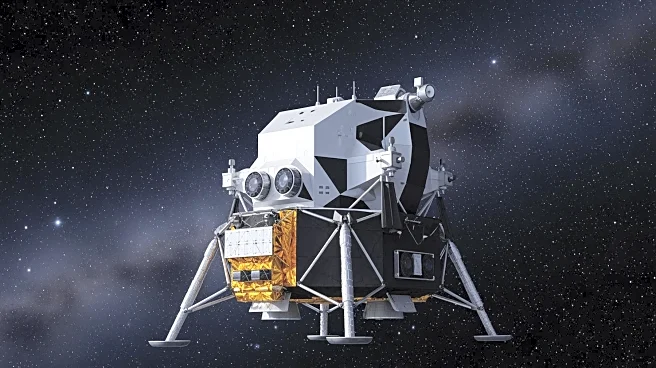What's Happening?
NASA has reopened the contract for the lunar landing vehicle for its Artemis III mission, initially awarded to SpaceX in April 2021. The decision comes after delays in the development of SpaceX's Starship
spacecraft, which is intended to transport astronauts to the Moon. NASA's acting administrator, Sean Duffy, announced the reopening of the contract to competitors like Blue Origin, citing concerns over Starship's progress. The Starship program has faced challenges, including a lengthy test flight schedule and issues with the spacecraft's upper stage during re-entry. Despite these setbacks, SpaceX maintains that it has achieved most contractual milestones on time or ahead of schedule, and continues to work towards the goal of returning humans to the Moon.
Why It's Important?
The reopening of the lunar landing contract is significant as it highlights the challenges faced by SpaceX in meeting NASA's timelines for the Artemis III mission. This development could impact the broader Artemis program, which relies on international collaboration and aims to establish a sustainable human presence on the Moon. The delays in Starship's development may affect NASA's ability to meet its 2027 target for the Artemis III mission, potentially altering the timeline for future lunar exploration. Additionally, the decision to reopen the contract introduces competition, which could drive innovation and improvements in lunar landing technology.
What's Next?
With the contract reopened, competitors like Blue Origin may submit new proposals for the lunar landing vehicle, potentially altering the dynamics of the Artemis program. NASA will likely evaluate these proposals to ensure the mission's objectives are met. Meanwhile, SpaceX is expected to continue its efforts to resolve the technical challenges facing Starship, aiming to demonstrate its capability to carry the necessary payload for lunar missions. The outcome of this contract reopening could influence the future direction of U.S. lunar exploration and international collaboration in space.
Beyond the Headlines
The decision to reopen the contract underscores the complexities of managing large-scale space programs amid shifting political and budgetary landscapes. NASA's direction has been influenced by changes in U.S. government leadership, affecting long-term planning and international partnerships. The Artemis program's reliance on international support highlights the interconnected nature of modern space exploration, where geopolitical factors can impact scientific and technological progress.










